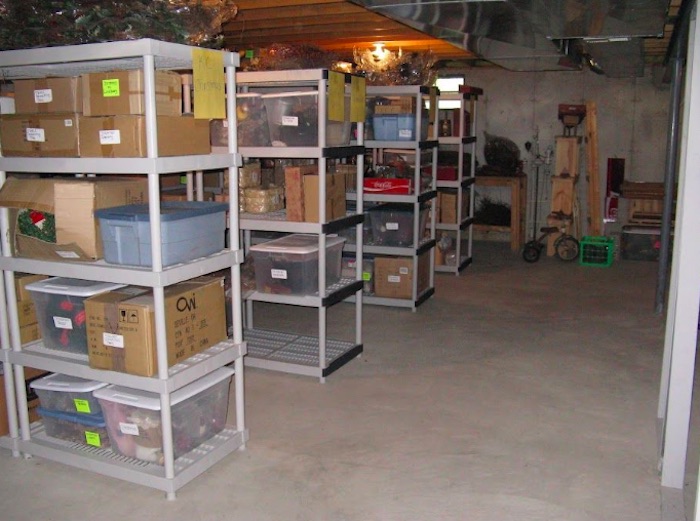
Basement. The very word itself can make us shudder just thinking about how cluttered and disorganized things have gotten down there over the years.
It may seem daunting, but once you get rid of excess clutter and implement a strong organizational system, you won’t have to worry about learning when it comes to how to organize a basement properly.
We want things to be as painless as possible for you, so we’ve put together the best tips and tricks for decluttering and organizing your messy basement the first time you do.
Basement Organization Ideas
**Click to auto-scroll by section
How to Organize Your Basement
Organizing your basement begins with getting rid of anything that you don’t use.
Basements, whether finished or unfinished, tend to become a catch-all for things we don’t know what to do with, no longer use or plan on throwing out at a later date.
But when those things have been sitting down in your basement for years, they tend to be forgotten, and slowly add to what is now a cluttered, disorganized mess.
Get Rid of Anything You Don’t Need
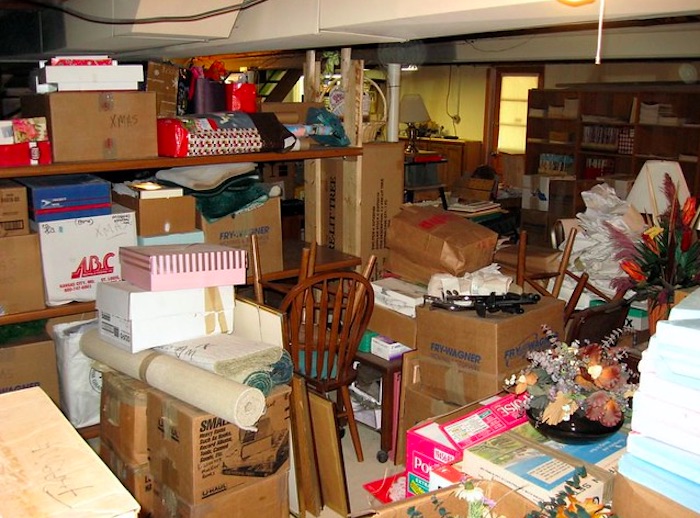
It’s hard to come to grips with the fact that you’ll probably never use those rusty old golf clubs or that broken tennis racket again, but getting rid of excess clutter is the first step to an organized basement. For most people, basement clutter includes:
- Toys & Playsets
- Old mattresses
- Outdated clothing
- Old patio furniture
- Unused sports equipment
- Unwanted or broken furniture
- Broken or outdated appliances
- Old or broken electronics and eWaste
- Old tools, hardware and lawn care equipment
- Broken treadmills, exercise bikes, Pilates machines and other exercise equipment.
Declutter Using the Three Pile Method
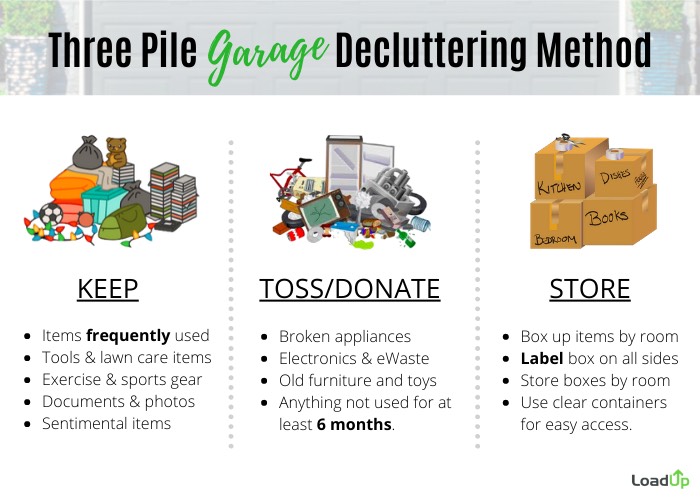
To avoid getting overwhelmed, work in sections. If your basement is divided into rooms, declutter one room at a time. For each decluttering project, you’ll make three piles: keep, toss/donate and store. Using our three pile method makes it easier to put everything back – or get rid of it – once you’re done decluttering.
- Keep: Things you use frequently including tools, lawnmowers & lawn care accessories, important documents and records, exercise equipment and sports gear in good working condition, old photos and sentimental items (these may also be stored if you don’t walk down memory lane very often).
- Toss/Donate: Anything that is in good or working condition should be donated. If you plan to hire a junk removal company to remove your excess basement clutter, LoadUp offers unique eco-friendly disposal methods that include donation and recycling. Instead of having to separate what to trash and what to donate, let us do the extra work for you.
- Store: Hang onto the things that you know you want to keep, but don’t need constant access to. You can use any kind of box for storage, including cardboard, plastic tubs or clear containers. It’s best to label every side of a box, but if that’s not an option, make sure you label the front for easy identification, at the very least.
Organize Your Basement into Zones
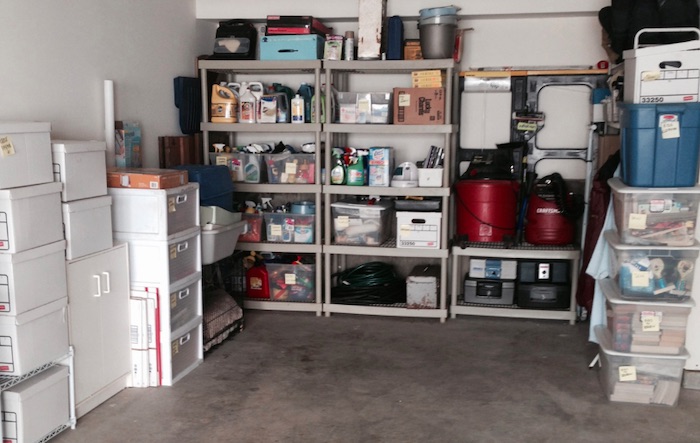
Now that you have moved out the clutter and know what you need to store, it’s time to put everything in its place. A great way to do this is to organize your basement into zones.
It doesn’t make a whole lot of sense to store your old wrapping paper next to boxes of kitchen gadgets and a broken ping pong table, right?
Keeping related items together allows you to easily remember where things are located when you need them. Since things stored in the basement are probably not used as often as the stuff we keep upstairs, it’s easy to forget where you last saw something if things don’t have any organization system in place.
Then we spend more time getting frustrated searching for something for 45 minutes that could have easily been found by implementing a few organizational tactics. That’s why an organized basement doesn’t just look great, it feels great!
Here are some common basement organization ideas by zone to get you started:
Tools & Hardware: Keep tools organized in drawers, carts, and bins. If someone in your household works with their hands a lot, the tools and hardware zone becomes a basement workshop. This is also where you should keep any lawn care equipment.
🛠️ Pro Tip: If you don’t have bins or drawers for nails, brads, fasteners, screws, nuts, bolts and other hardware, try using mason jars with lids. Don’t forget to label each jar.
Holiday/Gifts: Any decorations you have for holidays should be stored in the same place but ideally kept in different storage bins or totes. This area can also include wrapping paper, bows, boxes, etc.
Kids’ Stuff: Toys, games, yearbooks, clothing, playsets, etc.
Sports/Exercise: Camping gear, sports and athletic equipment, kayak, canoe, exercise equipment, weights, Pilates bands, etc.
Pantry Overstock: If you keep a surplus of food, toilet paper, paper towels, bottled water, canned goods or any other pantry items in the basement, organize like items together. Keep things organized by date, with the nearest expiration date in the front, and the furthest in the back.
Room-by-Room Storage: Box up everything from your “store” pile. Label boxes on every side. Use clear containers for finding things easily, if you don’t have cardboard boxes to use.
Organizing the Basement Storage Area
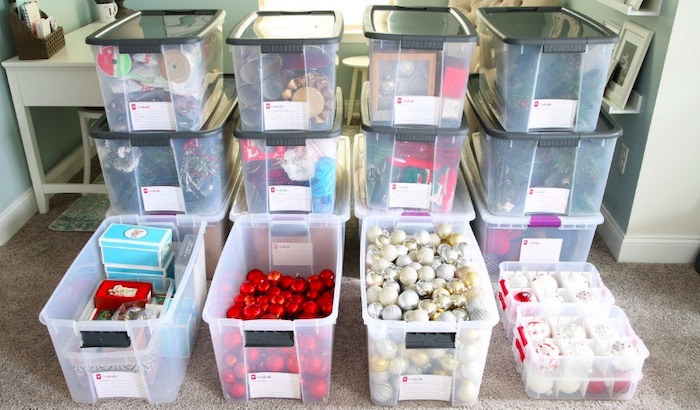
A little organization goes a long way. Here are some items to help with organizing basement storage that will make everything easy to find:
- Wire baskets
- Wooden crates
- Plastic tubs (small and clear for on-shelf, large colored boxes with lids for floor storage)
- Clear plastic cubbies and drawers
- DIY wooden shelving
- Pegboards for tools and accessories
Once you’re done organizing, don’t forget to schedule a junk removal appointment with LoadUp to pick up your toss/donate piles. Got piles of junk? Text a pic to (678) 884-4738, and we’ll get back to you with a custom, no-obligation junk removal quote.
LoadUp can haul away all your clutter for eco-friendly disposal right from your basement, so you don’t have to struggle to carry everything upstairs yourself! Any items that are in good working condition will be donated to a local or national charity. Items that don’t qualify for donation will either be recycled or disposed of in the most eco-friendly way possible.
Related Articles from the Trash Talk Blog:

